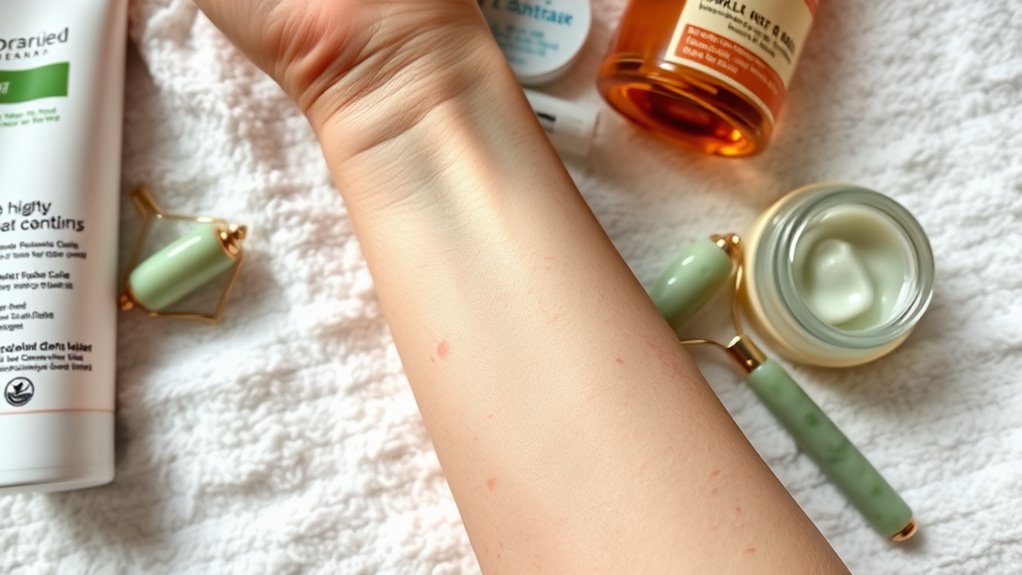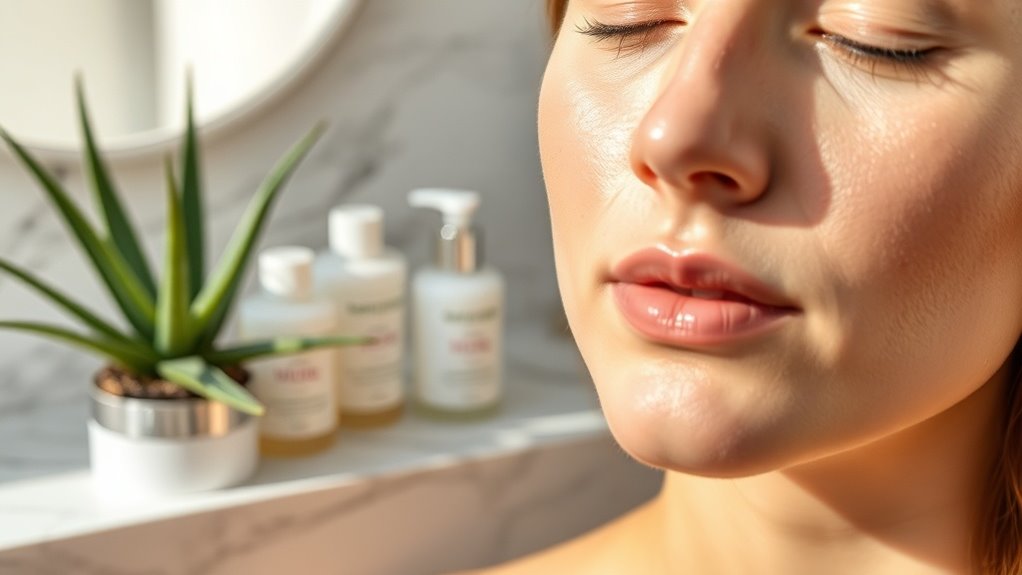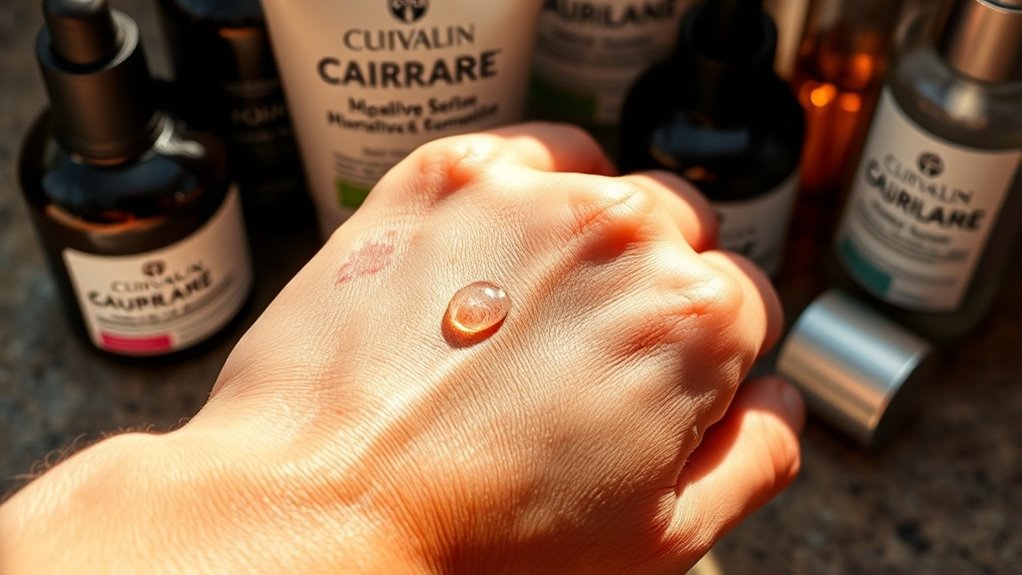7 Sensitive Skin Mistakes That Could Be Making Things Worse
If you have sensitive skin, you might unknowingly make mistakes that worsen your condition. Over-exfoliating, neglecting sunscreen, or using hot water can all strip your skin of its protective barriers. Even seemingly minor choices, like avoiding ceramides or ignoring patch tests, can lead to irritation. Understanding these common pitfalls is crucial for maintaining healthy skin. Let’s explore each mistake and how to correct them for better skin health.
Overusing Exfoliants
How often do you exfoliate your skin?
If you have sensitive skin, overusing exfoliants can lead to irritation, redness, and damage to your skin barrier. It’s crucial to find a balance in your sensitive skin care routine. Instead of daily exfoliation, consider limiting it to 1-2 times a week. Choose gentle exfoliants, such as enzymatic or mild chemical types, to minimize irritation. Always follow exfoliation with a soothing moisturizer to restore hydration. Paying attention to your skin’s response is essential; if you notice discomfort, cut back immediately. Additionally, be aware that signs of over-exfoliation can manifest as increased sensitivity and breakouts. Prioritize your skin’s health to achieve the best results in your sensitive skin care regimen.
Ignoring Ingredients Labels
Are you truly aware of what’s in the products you apply to your sensitive skin?
Ignoring ingredient labels can lead to adverse reactions, exacerbating your skin issues.
Common irritants like alcohol, fragrances, and certain preservatives can trigger inflammation and discomfort.
Instead, look for soothing ingredients such as aloe vera, chamomile, or ceramides, which help maintain your skin barrier.
Always check for allergens and perform patch tests before introducing new products.
By being vigilant and informed, you can significantly reduce the risk of irritation, ensuring your skin remains healthy and balanced.
Don’t underestimate the power of ingredient awareness. Additionally, avoiding harmful skincare ingredients can make a considerable difference in preventing irritation.
Skipping Sunscreen
Many individuals with sensitive skin often overlook the importance of sunscreen, mistakenly believing it may irritate their skin further.
However, UV exposure can exacerbate sensitivity, leading to redness and inflammation.
A broad-spectrum sunscreen protects against both UVA and UVB rays, crucial for maintaining skin health.
Look for mineral-based formulas containing zinc oxide or titanium dioxide, as these are less likely to cause irritation.
Apply sunscreen daily, even on cloudy days, to form a protective barrier.
Remember, consistent use can prevent long-term damage and enhance your skin’s resilience, making it an essential part of your skincare routine. Additionally, sensitive skin routines should always include sunscreen to avoid worsening irritation.
Don’t skip it.
Using Hot Water for Cleansing
What temperature do you usually set your water when cleansing your face?
If it’s hot, you might be aggravating your sensitive skin.
Hot water strips away natural oils, leading to increased dryness and irritation.
This can compromise your skin’s barrier, making it more susceptible to redness and inflammation.
Instead, use lukewarm water, as it effectively removes dirt without disrupting your skin’s natural moisture.
Always follow up with a gentle cleanser designed for sensitive skin to maintain hydration.
Remember, the right temperature can make a significant difference in your skin’s health and overall appearance. Using hot water is one of the common face washing mistakes that can exacerbate skin issues.
Adjust accordingly for better results.
Relying on Fragranced Products
Relying on fragranced products can pose a risk for those with sensitive skin due to allergens found in both natural and synthetic fragrance ingredients.
Many scented products may trigger irritation or allergic reactions, leading to discomfort.
Opting for unscented alternatives can help minimize these risks and maintain skin health. Additionally, it’s important to be aware of the potential effects on skin health that fragrances can have, which can exacerbate sensitivity in some individuals.
Allergens in Fragrance Ingredients
Have you considered the potential allergens hidden in the fragrance ingredients of your favorite products?
Many common skincare and cosmetic items contain fragrances that can irritate sensitive skin.
Identifying these allergens is crucial for maintaining skin health.
Here are some common allergens to watch out for:
- Limonene
- Linalool
- Geraniol
- Citral
- Eugenol
Using products with these ingredients may exacerbate your skin issues.
Always check labels and opt for fragrance-free or hypoallergenic alternatives to minimize the risk of adverse reactions.
Prioritizing ingredient awareness can significantly improve your skin’s overall condition.
Natural vs. Synthetic Fragrances
Fragrance ingredients can vary significantly, with options ranging from natural to synthetic sources. When choosing products, it’s crucial to understand how these fragrances can affect your sensitive skin. Natural fragrances often come from plant extracts, while synthetic fragrances are chemically formulated. Both can cause reactions, but synthetic options usually contain more allergens.
| Type | Source |
|---|---|
| Natural Fragrances | Plant extracts |
| Synthetic Fragrances | Chemical compounds |
| Potential Irritants | Variable |
| Allergen Levels | Often higher |
Always patch-test before use to determine how your skin reacts to these fragrances.
Unscented Product Alternatives
When searching for skincare products, how can you ensure you’re choosing effective options without aggravating your sensitive skin?
Unscented products are essential to avoid potential irritants.
Here are some alternatives to consider:
- Fragrance-free moisturizers: Look for formulations specifically labeled as such.
- Hypoallergenic cleansers: Choose gentle cleansers that minimize irritation.
- Non-comedogenic sunscreens: Select broad-spectrum options that won’t clog pores.
- Natural oils: Consider unscented options like jojoba or argan oil for hydration.
- Botanical extracts: Seek products with soothing ingredients like aloe vera or chamomile.
These choices can help maintain your skin’s integrity while preventing unwanted reactions.
Not Moisturizing Enough
Moisturizing your skin is crucial for maintaining hydration and preventing irritation, especially for sensitive skin. Choosing the right moisturizer and applying it frequently can significantly improve your skin’s barrier function. Neglecting this step can lead to dryness, redness, and increased sensitivity. Incorporating a soothing skincare routine can further enhance your skin’s comfort and resilience.
Importance of Hydration
How often do you consider the role hydration plays in your skin’s health?
Proper hydration is essential for maintaining your skin’s barrier function and overall appearance.
When you don’t hydrate enough, you may experience increased sensitivity and irritation.
Here are key reasons to prioritize hydration:
- Supports skin elasticity
- Reduces dryness and flakiness
- Enhances the skin barrier function
- Minimizes redness and irritation
- Promotes a healthy, radiant complexion
Inadequate hydration can exacerbate existing skin issues, so ensure you’re drinking enough water and incorporating hydrating products into your routine.
Your skin will thank you for it.
Choosing the Right Moisturizer
Are you sure you’re using the right moisturizer for your sensitive skin?
Selecting a moisturizer with suitable ingredients is crucial.
Look for products labeled as hypoallergenic and fragrance-free, as these minimize the risk of irritation.
Ingredients like ceramides and hyaluronic acid can effectively hydrate and strengthen your skin barrier.
Avoid moisturizers containing alcohol, sulfates, or harsh exfoliants, which can exacerbate sensitivity.
Pay attention to your skin’s reactions; if irritation occurs, discontinue use immediately.
Always perform a patch test before applying a new product extensively.
Prioritizing the right moisturizer can significantly improve your skin’s health and comfort.
Frequency of Application
Often, individuals with sensitive skin underestimate the importance of frequent moisturizing.
Insufficient application can exacerbate dryness and irritation, leading to a cycle of discomfort.
To maintain optimal skin health, consider the following:
- Apply moisturizer at least twice daily.
- Reapply after washing your face or hands.
- Use a thicker cream at night for overnight hydration.
- Layer lightweight serums under your moisturizer for added benefits.
- Adjust frequency based on environmental factors, like heat or cold.
Neglecting Patch Testing
While you might be eager to try new skincare products, neglecting patch testing can lead to adverse reactions, especially for those with sensitive skin. A patch test helps identify potential allergens or irritants, minimizing your risk of discomfort. Always remember to apply a small amount of the product to a discreet area and wait 24 hours for any reaction.
| Product Type | Common Irritants | Recommended Action |
|---|---|---|
| Moisturizers | Fragrance, alcohol | Test on inner arm |
| Serums | Acids, essential oils | Test on wrist |
| Sunscreens | Chemical filters | Test on behind ear |
| Exfoliants | Granules, enzymes | Test on forearm |





